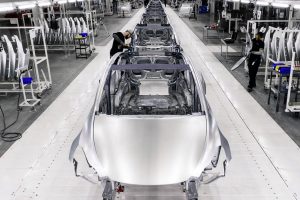- 🚚 Tesla plans multiple configurations for the Semi to meet diverse buyer needs.
- 🏭 Mass production of the Semi will occur near Giga Nevada, targeting 50,000 units per year.
- 💡 The Semi aims to be competitively priced to accelerate electric truck adoption.
- ⚡ The Semi’s efficiency has already reached 100 kWh per 100 kilometers.
- 📊 Over 4.65 million miles have been driven by Tesla Semi’s pilot fleet.
- ⏱️ A Tesla Semi has achieved 248,000 miles in just 18 months.
- 🔧 The Tesla Semi fleet maintains a 95% uptime, accounting for maintenance.
In the ever-evolving landscape of electric vehicles, Tesla’s Semi stands out as a game-changer in freight transportation. With its ambitious production goals, insistence on efficiency, and innovative design, the Tesla Semi is set to transform how goods travel across the globe. In this comprehensive examination, we delve into the key aspects that make the Tesla Semi significant, analyzing how it aims to revolutionize the trucking industry.
The Vision: Multiple Configurations for Diverse Needs
Tesla’s strategy for the Semi includes the development of multiple configurations, ensuring that the vehicle can be customized according to diverse buyer needs. This approach underscores Tesla’s commitment to providing flexibility and catering to specific applications, from short-haul urban deliveries to long-range freight transport. Such adaptability is crucial in addressing varying operational requirements and maximizing the Semi’s utility across different sectors.
Scaling Up: Mass Production at Giga Nevada
The production of the Tesla Semi is set to scale up significantly, with plans to manufacture 50,000 units annually at their facility near Giga Nevada. This mass production not only aims to meet increasing demand but also to bring economies of scale that can make the Semi more affordable. The choice of Giga Nevada as the production hub highlights Tesla’s strategic positioning near supply chains and crucial transport links, allowing for efficient distribution.
Competitive Pricing: A Pivotal Role in Market Penetration
Price competitiveness is a central theme in Tesla’s strategy for the Semi. By benchmarking their electric truck against traditional diesel options, Tesla seeks to accelerate the adoption of electric trucks in the industry. This approach is expected to lower barriers for entry, enabling more companies to transition to sustainable transport solutions and reducing the overall carbon footprint of freight transportation.
Engineering Excellence: Setting New Standards in Efficiency
Efficiency is a hallmark of the Tesla Semi, already achieving an impressive milestone of 100 kWh per 100 kilometers. Such efficiency translates to lower energy consumption and cost savings for operators, making the Semi an economically viable alternative to conventional trucks. By continuing to push the boundaries of electric vehicle technology, Tesla not only enhances performance but also drives broader acceptance of sustainable transport solutions.
Robust Performance: Analyzing Fleet Data
The Tesla Semi has collectively logged over 4.65 million miles within its pilot fleet, showcasing its capability and potential. Notably, one Semi has managed to clock 248,000 miles in just 18 months, exemplifying its reliability and endurance. These figures speak volumes about Tesla’s engineering prowess and underscore the Semi’s ability to meet rigorous operational demands.
Reliability: Maintaining Uptime for Maximum Productivity
An impressive 95% uptime has been maintained by the Tesla Semi fleet, taking both scheduled and unscheduled maintenance into account. High uptime is a critical factor in fleet operations, minimizing downtime and ensuring consistent performance. Tesla’s focus on reliability means that businesses can trust the Semi to keep their logistical operations running smoothly, reducing delays and boosting efficiency.
Conclusion: Driving Towards a Greener Future
The Tesla Semi is not just a vehicle; it’s a vision for a sustainable future in freight transport. By focusing on efficiency, reliability, and mass production, Tesla is paving the way for a new era in the trucking industry. The Semi’s performance and adaptability prove that electric trucks are not only feasible but can outperform traditional diesel fleets. As Tesla continues to innovate, the widespread adoption of electric freight vehicles seems not only possible but inevitable.





